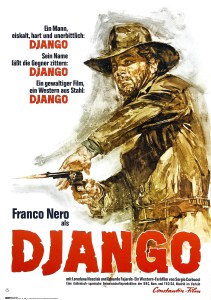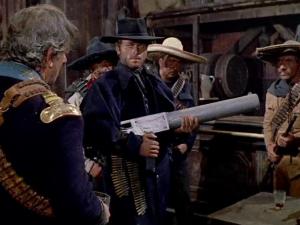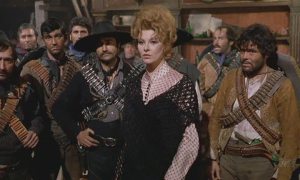Between this blog and my previous one, Professor Damian’s Public Domain Treasure Chest, I’ve been writing about movies for quite a while now. Because of that, there are a lot of posts that have simply gotten lost to the mists of time. So, I figured I’d use the idea of “Throwback Thursday” to spotlight some of those older posts, re-presenting them pretty much exactly as they first appeared except for updating links where necessary or possible, and doing just a bit of re-formatting to help them fit better into the style of this blog. Hope you enjoy these looks back.
Looking back to the early days of this blog – February 13, 2013 to be exact, and one of what appears to still be one of the most popular posts here. Not too surprising, I suppose, considering the popularity Tarantino and of Django Unchained. This post, however, takes a look at the original movie upon which QT’s movie was based (well, after which the main character of the movie was named), and at the negative effects that can sometimes come from a bad dubbing job.
As always, I’ve not made any changes to the original post, though in this case I really would like to have done some editing.
———————-
Rechained By Dubbing – Django (1966)
***SPOILER WARNING*** In this post, I’m going to be discussing differences between the dubbed and subtitled versions of Sergio Corbucci‘s 1966 film Django, and specifically the ending of the movie, so if you haven’t seen it (and I highly recommend that you do) you might want to turn back now. You have been warned! ***END WARNING***
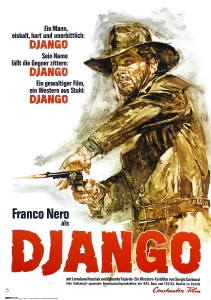
Okay, I’m going to just go ahead and get this part out of the way. I absolutely loved last year’s Django Unchained, Quentin Tarantino‘s “ode” to the spaghetti western genre. Despite its flaws, obvious and otherwise – yes, I know, some say it’s too long, but to them I’d ask what specifically would you cut, and yes, we can all agree that QT’s “Australian” accent is a joke, but to me he’s earned the indulgence, and yes… and yes… – in the end, it’s exactly what it sets out to be: one film maker’s tribute to an influential genre that he obviously loves, and an entertaining afternoon or evening at the theater for the rest of us, and in the end, that’s enough for me.
But the biggest thing that I like about QT’s movie is that it has brought new attention to a genre of movies that I find is largely unfamiliar to a vast swath of today’s younger movie-going audience, the aforementioned “spaghetti western”, and the fact that it extends beyond just Clint Eastwood and Sergio Leone. As a matter of fact, it’s because of Tarantino’s movie that my favorite place to watch films here in Nashville, the Belcourt Theater, was able to show a retrospective of films by one of the other great directors of the genre, Sergio Corbucci, which included his 1966 masterpiece, the original Django.
Now I could go into a lot of detail about Corbucci’s film and why I think it’s so good, but that’s another post for another time. Instead, today I simply want to look at one part of the movie, specifically the end of it, and to highlight what may be one of the greatest travesties of re-dubbed films ever.
You see, there are actually two versions of the film in circulation at the moment, one, the first one that I saw, is an Italiian language version with subtitles. The other, and the most commonly-found version on places like YouTube (as a matter of fact, the entire dubbed version is available there for streaming if you so desire), is the English language dubbed version.
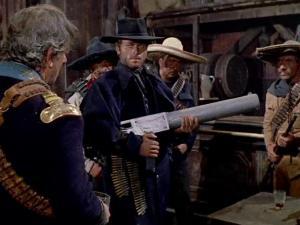
Now, you might think that in the process of dubbing a movie into another language the people responsible would try to stick as closely as possible to the original, and I’m sure in many cases that is true, and probably more so today than in the past. But there are other things which also have to be considered when movies are being dubbed. First there is the problem that both subtitlers and dubbers face – idiomatic language. There are simply some times that a direct translation, either because of cultural references or because the words have no direct correlation, just doesn’t make sense. (I was recently watching a subtitled version of a Japanese movie that attempted to use supertitles as footnotes to these kind of translation issues, but to be honest, that was truly distracting.) The other issue is mouth movements. One of the most often-heard complaints, especially back when I was growing up, about watching foreign movies was that the lip movement were so far out of sync with the words being said that it ended up being either incredibly distracting or downright humorous, and that’s why so many people said they simply couldn’t watch “furren” movies.
Now, it’s possible that if asked, the translators of the dubbed version of Django might claim either one of these to be the case in the defense of many of their choices throughout the film, and they may be legitimate claims. However, when it comes to the ending… Well, I’ll tell you what, before we go any further, why don’t we have a look at that ending? The part I’m specifically going to be focusing on is from about 4:00 to 6:20 in this clip, but go ahead and watch the whole thing if you really want the set-up.
Ok, so we have our protagonist at his seemingly most defenseless, his hands broken, trying to get off one last good shot, and being taunted by his greatest adversary, Major Jackson. And his cry of “Can you hear me ?!” is appropriate to the preceding lines about “You should start your praying.” and “I can’t hear you!”, which is fine as far as it goes.
However, if you watch the Italian version, you find out that the dubbing really diverges from the original in a way that not only lessens the impact of the scene, but also removes the ironic humor from it, a factor which goes a long way to making the entire film such a joy to watch. You see, in that scene the original version, which does have Jackson taunting Django about saying his final prayers, doesn’t have the inanities about his burial suit. Instead, Jackson emphasizes each shot by invoking a part of the holy trinity. So we wind up with “In the name of the father…” >BANG< “and the Son…” >BANG< “and the Holy Ghost” >BANG< to which Django then adds the capper, as during his final salvo which takes down the major and his men he shouts “AMEN!!!”
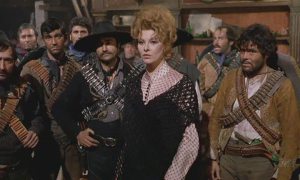
Now some might argue that the change was made due to sensitivity to the religious imagery which it invokes, but considering that that imagery is not only a recurring thread throughout the movie, but at times already a large part of its humor, I can’t see that as a reasonable defense. Nor do the other two arguments I mentioned above work, as there is no problem with the language translating, and the original lines actually fit the mouth movements perfectly.
No, this simply seems to be a case of “change for change’s sake”, and it’s one that, when I actually saw it while watching the dubbed version on the recent blu-ray release (both versions are on the disk, and I have to say they look gorgeous and it gets my highest recommendation) made me want to throw the box directly through the TV. Fortunately, I restrained myself, but really it was that bad a moment.
In the end, though, what it comes down to is this: if you have the option, you should definitely check out the subtitled version instead of the dubbed one, But if the latter is the only option available, then go ahead and watch that, with the caveat that there definitely is something “lost in translation” because despite those flaws, the strengths of the movie still largely come through.
So how about you? Have you seen either version? If so, which one and what did you think about it? And what are your thoughts in general about the argument concerning subtitles versus dubbing? I’d love to hear your comments, pro or con for either side. Just click on the comment button below and share your thoughts. Or head on over to the Facebook page and join in the discussion there.
Oh, and while you’re at it, why not click one of the share buttons below and bring your friends into the discussion too? The more the merrier! (Just please keep any comments civil, and respect your fellow commenters. After all, there’s no reason for gunfire here.)
And as always, until next time, happy viewing!
—————————–
Hope you enjoyed this blast from the past.

